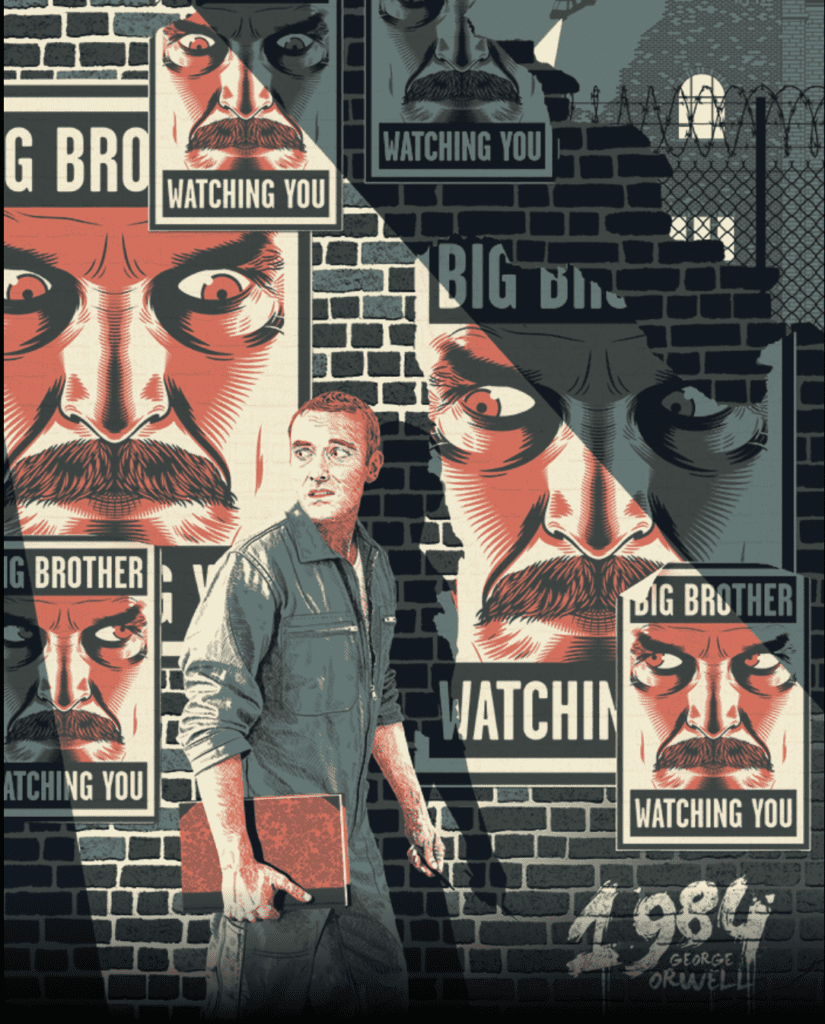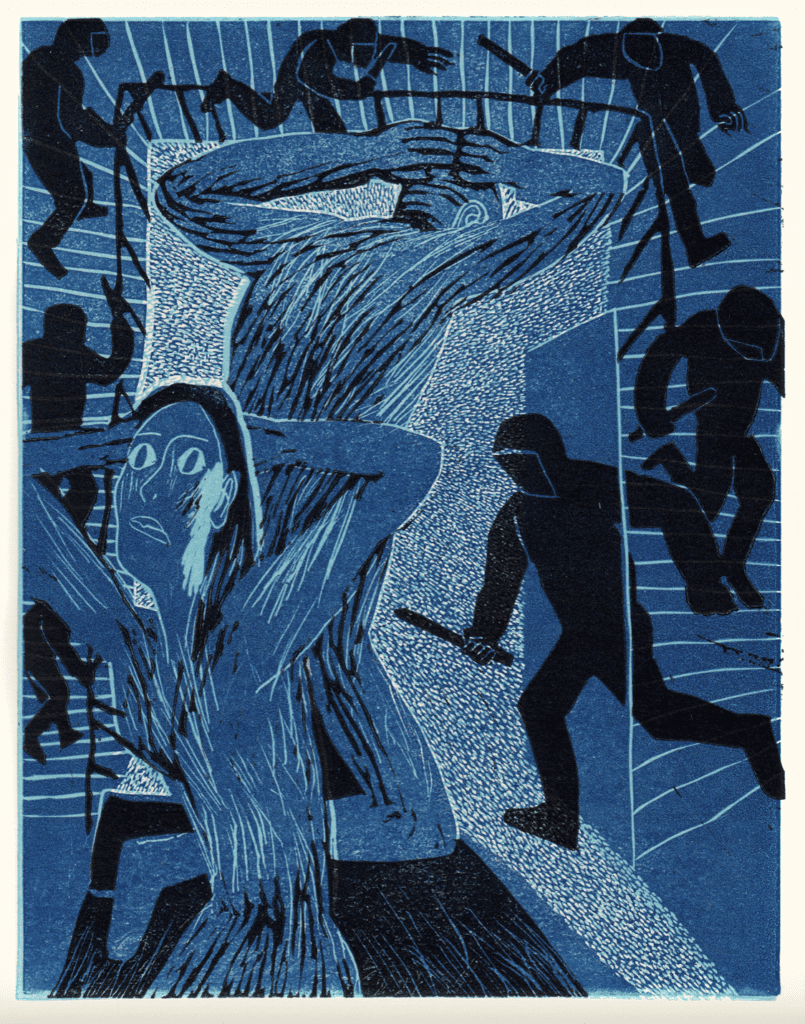Back in 1949, an English writer George Orwell published a book titled 1984 after being inspired by the USSR. While reading the book, one can vividly see the resemblances between the terrifying story and the history of the Soviet Union. Most readers can recognize the national enemy Goldstein in a Soviet dissent Trotsky or see the famous “2+2=5” slogan as a reference to a five-year economic plan that the communist party stimulated people to fulfill in 4 years. However, while the foreign audience sees the already collapsed USSR in 1984, Russian readers distinguish their current Motherland in the plot. It has been several years since some Russian intellectuals proposed to re-read 1984 and make an effort to recognize familiar events in it. Although I am not a fan of fiction, the hype over it stimulated me to read it. Little did I know that the story was going to be that realistic. In this article, we are going to look at dictatorship and the security services system. So, let’s see how George Orwell’s 1984 is still applicable to modern-day Russia.
Putin and Big Brother

As the plot takes place in a dictatorship country, it is obviously led by one person and a specific institution. In 1984, there is an absolute worship of Big Brother, a person who leads the Party. His persona is believed to always be right, his words cannot be doubted, and his portrait is literally considered an icon. George Orwell clearly used Joseph Stalin as a reference. Stalin’s figure used to be undeniable and terrifyingly massive. The cult of his personality was so huge that some members of his time still believe in the tyrant’s supremacy and rightness. Despite the next General Secretary Nikita Khrushchev dispelled Stalin’s image and proved that the cult of any person is dangerous, nowadays Russia is back to believing in someone’s hegemony. This someone is Vladimir Putin, the current president of the Russian Federation. One of the ways in which Putin resembles Big Brother is how outstanding his figure is in the political field. Like Orwell’s dictator, the President has cleared Russian politics from any opponents. Putin has either put them in jail, like Alexey Navalny, or forced them to flee the country and continue their activity far from Russia. Such supremacy gives him an absolute power to rule Russia and not care about upcoming elections, where he has no credible competitors.
Moreover, in order for Big Brother to maintain his trustworthiness and reliability, the Party from 1984 has to take care of his promises and forecasts. If some of his predictions fail, they must be rewritten to avoid doubt in the dictator’s rightness. For instance, Winston, the protagonist who works in the Ministry of Truth, has to edit Big Brother’s speech about plans in the warfront that he predicted some time ago, since the predictions did not come true. This is done in order to maintain Big Brother’s dependability and “erase” his mistaken predictions from existence. Similarly to Orwell’s dictator, Vladimir Putin also gives plenty of promises and predictions of a bright future for Russia. However, as it is almost impossible to delete information from the internet, the Russian President’s speeches cannot be edited. So, that is why he just claims to change his opinion on matters throughout the years. For instance, since he became Head of the State in 2000, numerous times Putin said that he would not raise the pension age while he is in charge, “I am against increasing the terms of retirement age. And while I am president, there will be no such decision.” But apparently, he did not expect his presidency to last for 20 years. In 2018, the Russian President signed a controversial bill raising retirement age by 5 years. This and other examples of his hypocrisy make him no better than Big Brother and his chimerical promises.
What Big Brother and Vladimir Putin have more in common is their way of talking. In 1984, the dictator’s style of speaking is described as “at once military and pedantic” with “a trick of asking questions and then promptly asking them” (Orwell, 1949) As an example, Big Brother says, “What lessons do we learn from this fact, comrades? The lesson is…” (Orwell, 1949). The Russian President has a similar manner of talking in a military way. A famous quote of his is built on this structure, “Firstly, it was Germany that attacked the Soviet Union on June 22, 1941, and not vice versa, and secondly, let us not forget who stormed Berlin. Was it the Americans, the British or the French? No, it was the Red Army. Have you forgotten this? It is easy to recall, for it is an obvious fact.” Putin asked the question and answered it right away. Both Big Brother’s and the Russian President’s speeches also tend to address the nation itself, grouping up the masses rather than paying attention to the individuals. Such manner makes them cold towards the societies and alienates them from the citizens.
The Supremacy of Security Forces

As it always happens in dictatorships, the tyrant needs his army to control the masses. In 1984, Big Brother has a whole system of keeping his citizens in awe. A special institution called the Thought Police spies on Party people physically, and more terribly, mentally and remotely through telescreens, microphones, and cameras. In the case of thoughtcrime (thinking against the status quo), the Police arrests the culprits and instills the Party’s ideology into their minds through interrogations and torture. As soon as the criminal has absorbed the imposed dogma, they are put back to their routine, but as a corpse or so-called unperson. This process of catching dissents is never-ending and must be ignored by innocent citizens. Otherwise, if someone remembers or recognizes the unperson, it is also considered a thoughtcrime. Thus, Thought Police is one of key institutions that maintains the whole State structure and empowers the security guards.
The Russian security system works in an alike way. As President Putin is a former security forces member, his State arrangement is built on absolute supremacy of the Federal Security Service (or FSB, a successor of the Soviet KGB), National Guard of Russia, the Ministry of Internal Affairs, the Investigative Committee, and the Prosecutor’s office. Their methods are similar to those of the Thought Police in terms of violence. Firstly, security services pounce to the home of a suspect, often without even showing a permit. In 1984, this also happens with the Thought Police getting into Mr. Charrington’s place to arrest Winston and his girlfriend Julia. Then, the Russian police storm into the house searching for something provocative and end up creating a terrible mess, while also confiscating belongings and even detaining the owner. During interrogations, the suspected get tortured to extract confessions and get frightened with long prison terms. In a Network criminal case, 9 young anarchists were accused of organizing a terrorist group and ended up receiving up to 18 years behind the bars. Amateur airsoft players, a game with use of mock air weapons, were tortured with electrocution and beat to the point where they learned fake testimonies and confessed to extremist actions. Such an appalling case brings us back to torments of Winston in 1984 in the notorious Room 101 where O’Brien, the Thought Policeman, uses electric shocks to change the character’s ideology.
Overall, to further make connections, Russian jails look like they came straight from the dystopian book. Cold cells, hard-shelled beds, and moldy walls cannot be compatible with life. Detentionees in Russia told stories of tortures and unbearable conditions in remand prisons. Some even had to sleep in a cell with two or three times more people than it is supposed to hold. Others got injuries like electric burns from electric shocks, concussions, and open lacerations. Such a terrible environment leaves no space for any warm feelings in a mind of a tortured human, and makes them blow upon their friends and family. Just like Winston from 1984 has to betray Julia under intolerable suffering, teenagers from a small Siberian town Kansk had no choice except to incriminate another friend. Boys were forced to confess to having a terrorist training, such as throwing Molotov cocktails and an intention to blow up the FSB building that they had built in a videogame Minecraft. One out of three boys pleaded innocent and received 5 years in a penal colony during his 16th year of life. So, jails in Russia and prisons in George Orwell’s story share the same purpose: to unperson a suspect.
One of the most frightening stories that resembles 1984 is regarding The New Greatness case. In 2020, a group of young adults was sentenced to 7 years in prison for creating “an extremist organization” that was going to overthrow Vladimir Putin’s regime. The defendants used to chat in Telegram for different topics until a man named Ruslan joined them and brought in politics as a constant topic of discussion. Then, they met in real life and wrote a charter of their group called “The New Greatness”. The document and Ruslan’s testimonies turned out to be the only proof of the group’s political intentions. Later, journalists proved Ruslan’s direct relation to the Security Service (FSB). The whole independent investigation ended up being a fabricated example of how Russian security services infiltrate into youth groups and set up criminal cases. Such a situation can remind us of how Thought Police’s agents, Mr. Charrington and O’Brien, make Winston believe in their latent opposition to the Big Brother’s regime. Both The New Greatness members and Winston, along with Julia, were caught in a security services’ trap. This serves a great deal for frightening and threatening other citizens with consequences in case of having political intentions and opposing thoughts.
Ultimately, after analyzing Vladimir Putin’s dictatorship and the supremacy of the Russian security services, it is obvious that Russia is stepping on a path of Oceania from George Orwell’s novel 1984. The despotism and total control of politics of the President’s persona resemble Big Brother’s totalitarianism, while bloody hands of FSB make Russians live in fear just like Thought Police does. The difference between the country and the novel is the randomness that the Russian state acts with, in contrast to the well-established system of Ingsoc. Russians never know who might be the next one to get under surveillance, whereas in 1984, every dissent knows they will eventually be caught. Nevertheless, there are more similarities and less differences to uncover in the next article, which will tell you about how Oceania’s social system is being implemented in Russia.
Featured image by: Marcus Spiske / Unsplash







